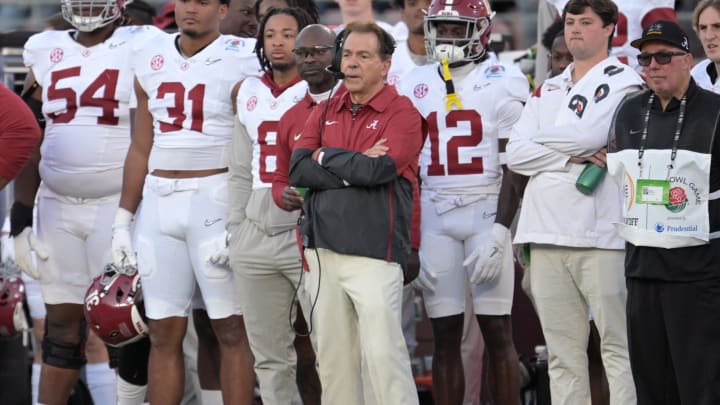Nick Saban Reveals Pressure of Assurances Contributed to Retirement Resolution

On Jan. 10, long-time Alabama head football coach Nick Saban announced his retirement, sending the sports world into a mass jaw-drop.
We knew this day would come, but still, no one was prepared to see those words in ESPN's Chris Low's news-breaking post on X (formerly known as Twitter).
49 hours later, the Crimson Tide found the seven-time National Champion head coach's successor in reigning AP College Football Coach of the Year Award recipient Kalen DeBoer from Washington.
Since then, Low has gathered the information from the 72-year-old's retirement announcement, and revealed one reason for it was the stress of players and assistant coaches counting on him to continue in the program for as long as they'll be there, but also a couple of other factors.
"I thought we could have a hell of a team next year, and then maybe 70 or 80 percent of the players you talk to, all they want to know is two things: What assurances do I have that I'm going to play because they're thinking about transferring, and how much are you going to pay me?" Saban told Low. "Our program here was always built on how much value can we create for your future and your personal development, academic success in graduating and developing an NFL career on the field.
"So I'm saying to myself, 'Maybe this doesn't work anymore, that the goals and aspirations are just different and that it's all about how much money can I make as a college player?' I'm not saying that's bad. I'm not saying it's wrong, I'm just saying that's never been what we were all about, and it's not why we had success through the years."
Saban is known for his deep assistant coaching tree throughout the years. While the amount of coaching talent he's helped produce in college football today is extremely impressive, the amount of times he's had to change game plans because of this is a lot to handle for anyone.
Low used former Alabama offensive coordinator Tommy Rees, who was hired in the 2023 offseason, as an example. That was Saban's seventh offensive coordinator, one of the most important roles in a coaching staff, in the past 11 years.
"People wanted assurances that I was going to be here for three or four years, and it became harder to make those assurances," Saban told Low. "But the thing I loved about coaching the most was the relationships that you had with players, and those things didn't seem to have the same meaning as they once did."
